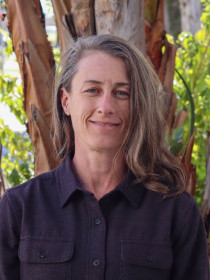
Megan Welsh Carroll
Connect with Megan
About Megan
Welsh Carroll uses her research skills to advance justice, health equity, and basic dignity. She currently conducts research about the disappearance of basic sanitation resources in urban environments, how people experiencing housing deprivation survive in sanitation deserts where restroom access is limited and of poor quality, and how we can work toward a vision of sanitation justice amid climate change and widespread housing affordability crises. Welsh Carroll co-founded and directs the Project for Sanitation Justice at San Diego State University.
Contributions
No Jargon Podcast
In the News
Publications
Analyzes under what conditions will the public accept homeless-serving housing and social service facilities in their neighborhood. Answers this question through a basic descriptive statistical analysis of a brief survey (respondent n=251) and a thematic analysis of seven focus groups with residents of San Diego, California (participant n=34).
Examines racialized encounters with the police from the perspectives of people experiencing homelessness in San Diego, California in 2020. Conducts a survey of (n = 244) and interviews with (n = 57) homeless San Diegans during initial shelter-in-place orders, oversampling for Black respondents, whose voices are often under-represented despite high rates of homelessness nationally. Reflects on these findings and our framework for envisioning a system of public safety that supports and cares for—rather than punishes—the most vulnerable members of our society.
Studies how racial disparities in police-community encounters are well documented, with people of color experiencing higher levels of police scrutiny. Identifies cognitive and discursive mechanisms which explain this complex and contradictory picture. Finds that officers’ accounts excuse, justify, or otherwise negate the role of race in routine police work, yet officers’ thoughts and actions are based on racialized and, at times, dehumanizing narratives about people and communities of color.
Draws on an analysis of San Diego Police Department traffic stop records, as well as officer survey and interview data, to examine the validity of the traffic stop data gathered and the compliance-related motivations of officers. Finds nineteen percent error rate in stop data submitted between 2014 and 2015, amidst evidence of substantial underreporting.
Finds for criminalized people, particularly those who have been recently incarcerated, applying for and maintaining public assistance—cash aid and/or food assistance—is an immediate and crucial element of survival. Examines how criminalized clients are understood by welfare workers in one large, densely populated California county.
Examines changes to how community supervision (parole and probation) is administered in California under AB 109 / Public Safety Realignment, and particularly, how these changes have been experienced by women on each form of supervision. Argues that decarceration’s continued emphasis on the control for the sake of public safety impedes the transformative potential of efforts to restructure the crime-processing system.
Presents findings from an ongoing study of the use of police to manage the issue of street homelessness in downtown San Diego, California. Draws on data collected over the past two years through brief, structured interviews (n=195), focus groups (n=23), and in-depth, semi-structured interviews (n=20) with un-housed people about their experiences with law enforcement. Shows how un-housed people make sense of and attempt to maneuver within a system of policing that attempts to erase homelessness from the urban landscape and that consequently functions to further deepen the marginalization of this already vulnerable population.